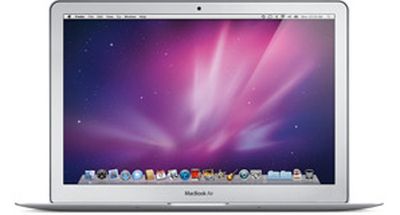NVIDIA/Intel Settlement Could Boost MacBook and MacBook Air Processor Speeds
Bloomberg reported last week that Intel and NVIDIA are in talks aimed at settling the legal dispute between the companies. The legal issues which began late last year
resulted in NVIDIA exiting the chipset business pending a resolution of the disagreement.
The details of the settlement were not revealed but a resolution could be good news for Apple, as pointed out by ArsTechnica.
Apple had adopted NVIDIA's chipsets to power its MacBook and MacBook Pro line in late 2008 providing their laptop line a boost in integrated graphics performance. The licensing dispute, however, prevented NVIDIA from supplying the next generation chipsets for Intel's Nehalem processors. This restriction most likely affected Apple's decision not to use the new Nehalem/Arrandale chips in the new MacBook Airs and the 13" MacBooks.
However, the licensing dispute meant that Apple couldn't upgrade the processors in some of its most portable machines, including the 13" MacBook models and its ultraportable MacBook Air, without giving up the benefit of the graphics boost from NVIDIA's integrated graphics. This, in turn, has left Apple to continue using Core 2 Duo processors - based on a decidedly outdated architecture - paired with an updated NVIDIA 320M controller. Despite the fact the final product offers good performance, the use of the positively ancient Core 2 Duo still looks bad for a company that markets premium products and demands a premium price.
Essentially, when given the choice between a faster processor vs faster integrated graphics in its price and space constrained machines, Apple opted for faster video performance.
If Intel and NVIDIA are able to come to terms and NVIDIA is able to provide next generation chipsets, Apple may be able to offer both the latest Intel CPUs and NVIDIA integrated graphics chips across all their machines.
Popular Stories
Since the iPhone X in 2017, all of Apple's highest-end iPhone models have featured either stainless steel or titanium frames, but it has now been rumored that this design decision will be coming to an end with the iPhone 17 Pro models later this year.
In a post on Chinese social media platform Weibo today, the account Instant Digital said that the iPhone 17 Pro models will have an aluminum...
Apple is continuing to refine and update iOS 26, and beta three features smaller changes than we saw in beta 2, plus further tweaks to the Liquid Glass design. Apple is gearing up for the next phase of beta testing, and the company has promised that a public beta is set to come out in July.
Transparency
In some apps like Apple Music, Podcasts, and the App Store, Apple has toned down the...
In select U.S. states, residents can add their driver's license or state ID to the Wallet app on the iPhone and Apple Watch, providing a convenient and contactless way to display proof of identity or age at select airports and businesses, and in select apps.
Unfortunately, this feature continues to roll out very slowly since it was announced in 2021, with only nine U.S. states, Puerto Rico,...
Apple will launch its new iPhone 17 series in two months, and the iPhone 17 Pro models are expected to get a new design for the rear casing and the camera area. But more significant changes to the lineup are not expected until next year, when the iPhone 18 models arrive.
If you're thinking of trading in your iPhone for this year's latest, consider the following features rumored to be coming...
Apple is expanding the ability to add an Apple Account Card to the Wallet app to more countries, according to backend Apple Pay changes.
With iOS 15.5, Apple updated the Wallet app to allow users to add an Apple Account Card, which displays the Apple credit balance associated with an Apple ID.
If you receive an Apple gift card, for example, it is added to an Apple Account that is also...
Three out of four iPhone 17 models will feature more RAM than the equivalent iPhone 16 models, according to a new leak that aligns with previous rumors.
The all-new iPhone 17 Air, the iPhone 17 Pro, and the iPhone 17 Pro Max will each be equipped with 12GB of RAM, according to Fixed Focus Digital, an account with more than two million followers on Chinese social media platform Weibo. The...
Apple should unveil the iPhone 17 series in September, and there might be one bigger difference between the Pro and Pro Max models this year.
As always, the Pro Max model will be larger than the Pro model:iPhone 17 Pro: 6.3-inch display
iPhone 17 Pro Max: 6.9-inch displayGiven the Pro Max is physically larger than the Pro, it has more internal space, allowing for a larger battery and...
The calendar has turned to July, meaning that 2025 is now more than half over. And while the summer months are often quiet for Apple, the company still has more than a dozen products coming later this year, according to rumors.
Below, we have outlined at least 15 new Apple products that are expected to launch later this year, along with key rumored features for each.
iPhone 17 Series
iPho...




















